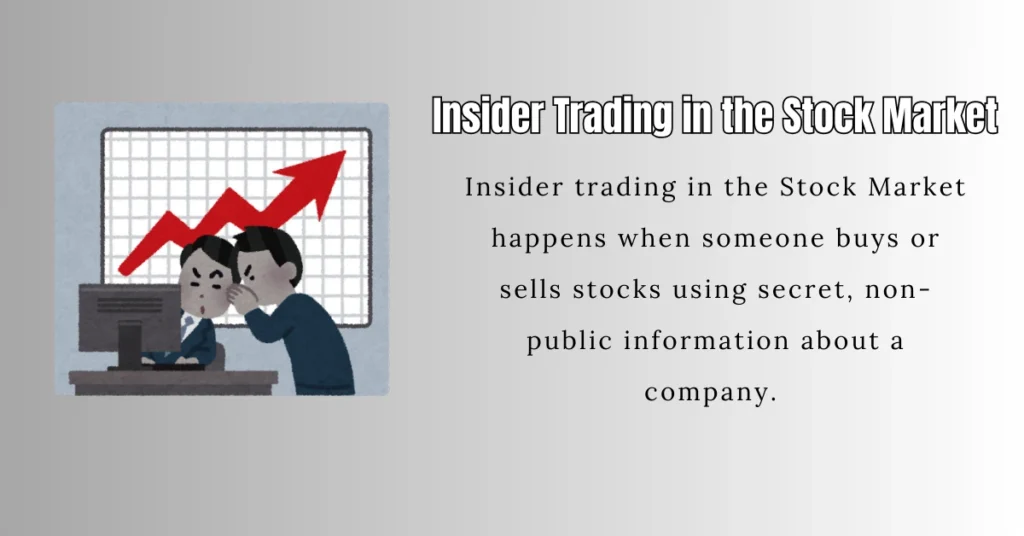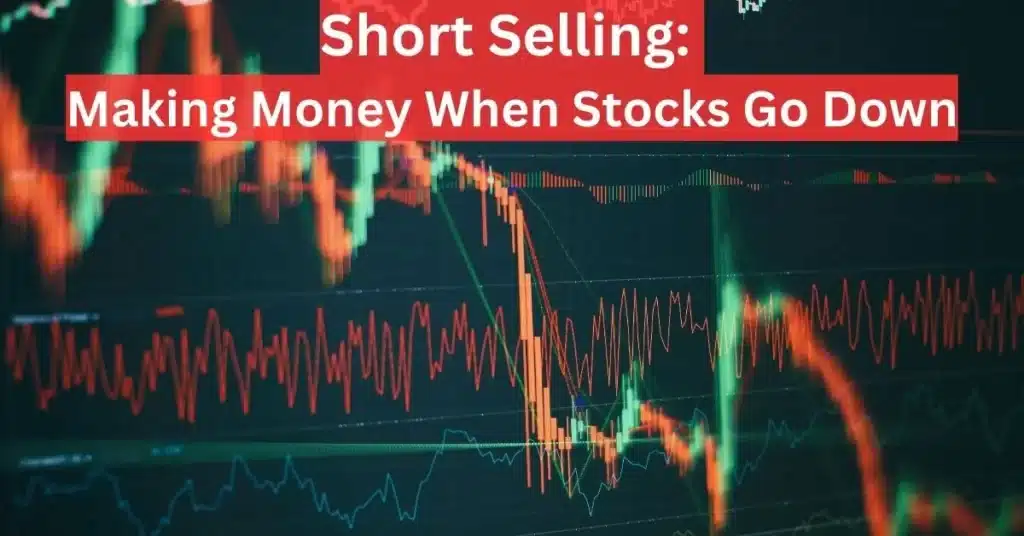Ever heard whispers about “ Insider Trading in the Stock Market ” but weren’t quite sure what it meant? You’re not alone.
It’s one of those financial buzzwords that can sound mysterious—or downright shady. But what really is Insider Trading in Stock Market, and why does it matter to anyone dabbling in stocks? Let’s break it down.
What Is Insider Trading in the Stock Market?
Insider trading happens when someone buys or sells stocks using secret, non-public information about a company.
Think of it as knowing the answers to a test before anyone else does. In the stock market, though, that kind of advantage isn’t just unfair—it’s often illegal.
Not every investor can be accused of insider trading. It specifically applies to those who have access to material, confidential information about a company because of their position or relationship with the organization. For example:
- Corporate Insiders: Executives, board members, or employees who know sensitive company details, like upcoming earnings or major business changes.
- Family and Friends: If a company insider shares non-public information with close contacts and trades based on it, they are also guilty.
- Advisors or Partners: Lawyers, auditors, or consultants working with the company who learn confidential details and use them to trade.
For instance, imagine you’re a senior employee at a company that’s about to announce record-breaking profits.
Before this news becomes public, you decide to buy shares, knowing the stock price will likely surge. That’s insider trading.
Similarly, if you tip off a friend about the profits and they trade on that information, they’re equally at fault.
It’s important to note that casual investors who base their decisions on public information—like news reports, financial statements, or analyst advice—are not engaging in insider trading.
The key difference is the use of non-public information, which creates an unfair advantage.
Legal vs. Illegal Insider Trading
Here’s the twist: not all insider trading is illegal. Wait, what? Yes, legal insider trading exists, but it must adhere to strict rules.
Legal Insider Trading
- Company executives, directors, or employees can buy and sell stock, provided they report these transactions to the Securities and Exchange Board of India (SEBI).
- These trades are public records, so everyone has equal access to the information.
Illegal Insider Trading
- This occurs when someone trades on material, non-public information. For example:
- A tech company employee learns about a game-changing product launch and buys shares before the news breaks.
- A friend or family member gets a tip from an insider and acts on it.
Real-World Examples of Insider Trading
Insider trading scandals have shaken the financial world, revealing how unethical actions can lead to severe legal and reputational consequences. Let’s delve into some notable cases, including an example from India:
1. Martha Stewart’s Legal Troubles
In 2001, lifestyle mogul Martha Stewart was accused of insider trading involving the biopharmaceutical company ImClone Systems. source.
Stewart sold her shares based on a private tip from her broker about the company’s upcoming FDA rejection of a key drug.
This tip saved her from significant financial loss but led to criminal charges. Stewart was convicted of obstruction of justice and making false statements, resulting in a five-month prison sentence, five months of house arrest, and a major dent in her public image.
2. Raj Rajaratnam and the Galleon Group
In 2011, billionaire hedge fund manager Raj Rajaratnam was convicted of orchestrating one of the largest insider trading schemes in U.S. history. source.
As the head of Galleon Group, a prominent hedge fund, Rajaratnam obtained insider tips from a network of corporate insiders and traded on this information to earn over $60 million.
His conviction on multiple charges of securities fraud and conspiracy resulted in an 11-year prison sentence and hefty fines.
This case remains a textbook example of the high stakes and severe penalties associated with insider trading.
3. SEBI vs. Rakesh Agrawal
In India, the Securities and Exchange Board of India (SEBI) has cracked down on insider trading as well. One significant case involved Rakesh Agrawal, a former managing director of ABS Industries. source.
Agrawal used confidential information about a takeover by Bayer AG to purchase shares of ABS in his brother-in-law’s name.
When the takeover was announced, the share prices soared, leading to substantial profits. SEBI investigated the matter and found Agrawal guilty of insider trading, imposing strict penalties and showcasing India’s commitment to maintaining market integrity.
Lessons from These Cases
These examples highlight the universal consequences of insider trading:
- Severe Penalties: Convictions often result in prison sentences, fines, and bans from trading.
- Reputation Damage: Even after serving penalties, rebuilding trust is an uphill battle for those involved.
- Market Trust at Stake: Such cases undermine public confidence in the fairness of financial markets.
The message is clear: insider trading is a high-risk game that can lead to life-altering consequences. For investors and corporate insiders alike, ethical behavior and adherence to regulations are non-negotiable.
Why Is Insider Trading a Big Deal?
At its heart, the stock market is built on trust and fairness. Everyone—whether a big investor or a small retail trader—relies on having equal access to information to make investment decisions.
Insider trading shatters this principle by giving an unfair edge to a select few who exploit confidential information for personal gain. This creates a deep imbalance and damages the integrity of the market.
Impacts of Insider Trading
1. On Investors
For everyday investors, insider trading feels like being invited to a game where the rules don’t apply equally.
Retail investors—people like you and me—end up at a disadvantage because we lack access to the same privileged information.
This sense of unfairness leads to frustration and often reduces public participation in the stock market. When fewer people trust the system, the market loses its vibrancy and inclusivity.
2. On Companies
When insider trading scandals surface, the companies involved often face significant fallout. Negative publicity can tarnish their brand and erode customer and investor trust.
Moreover, stock prices may plummet as confidence dwindles, leading to a loss of shareholder value. For example, when news of an insider trading investigation breaks, investors may panic-sell, believing the company is poorly governed or unethical.
3. On the Market
The ripple effects of insider trading extend to the broader market. Markets thrive on the belief that they are a level playing field.
When insider trading occurs, it creates a perception that the system is rigged—favoring the rich or well-connected.
This perception discourages participation, reduces liquidity, and threatens the market’s efficiency. Over time, it can erode the foundational trust that keeps global financial systems running smoothly.
Why Fairness Matters
Insider trading doesn’t just hurt the individuals directly involved—it undermines the entire financial ecosystem.
By leveling the playing field, regulators work to ensure that markets remain fair and transparent. After all, a trustworthy market benefits everyone, from the smallest retail investor to the largest institutional player.
When you invest, wouldn’t you want to know the game isn’t stacked against you? That’s why fighting insider trading is crucial—it’s about protecting the fairness that makes investing worthwhile for all.
How Is Insider Trading Detected?
It might seem like insider trading would be easy to get away with—after all, it’s done in secret. But regulators have powerful tools and strategies to catch those who break the rules.
Agencies like the Securities and Exchange Board of India (SEBI) use a mix of technology, analytics, and human intelligence to uncover suspicious trading activity.
Key Methods Used to Detect Insider Trading
1. Unusual Trading Patterns
One of the biggest giveaways is abnormal stock activity. For instance, if a company’s shares experience a sudden spike in volume or price just before a major announcement—like a merger or earnings surprise—it can set off alarm bells. Regulators investigate to see if anyone has access to non-public information and profited unfairly.
2. Whistleblower Programs
Sometimes, insider trading is exposed from within. Employees, partners, or associates with knowledge of illegal activities can report anonymously through whistleblower programs.
In many cases, these whistleblowers are incentivized with rewards, particularly if their information leads to a conviction.
3. Advanced Algorithms and AI
Regulatory bodies like the SEBI use cutting-edge technologies to monitor trading activities in real time. These systems analyze vast amounts of market data, looking for irregular patterns that human oversight might miss. Algorithms can match trades with known insiders or correlate them with confidential events.
4. Cross-Referencing Data
Regulators cross-check public records, communications, and trading logs. For example, they may look at phone records or emails to link a suspected trader to someone with insider knowledge.
5. The SEBI’s Market Abuse Unit
SEBI’s Integrated Surveillance Department (ISD) and Enforcement Department handle market abuse-related matters.
It focuses on detecting market manipulation, including insider trading. This team combines expertise in law, finance, and technology to crack down on offenders.
Case Example: How It Works
Imagine a company is about to announce a merger. A sudden surge in stock purchases by a group of individuals raises suspicion. Investigators might:
- Analyze the timing of trades compared to the announcement.
- Check whether those individuals have ties to the company or its insiders.
- Use whistleblower tips or communication records to confirm suspicions.
If evidence proves the trades were based on non-public information, the culprits can face hefty fines, bans, or even prison time.
Final Thoughts: Why Ethics Matter
Let’s be honest—making money in the stock market can be incredibly tempting. But here’s the thing: insider trading in the stock market isn’t just against the law; it’s a clear breach of ethics.
Think of it like cutting in line at a theme park—not cool, right? Now imagine doing that with millions at stake. That’s the kind of imbalance insider trading creates.
By choosing to play fair, you’re not just keeping yourself out of legal trouble—you’re contributing to a system where everyone has a fair shot.
It’s about protecting the trust that makes the stock market work for all investors, big or small.
So, the next time you see a stock making waves, take a moment to reflect: “Am I basing this on solid, public research—or something that feels off?”
When in doubt, it’s always better to stay on the right side of the rules. After all, in the long run, integrity is the best investment you can make.
FAQs
1. Can regular investors commit insider trading?
Yes, if they act on material, non-public information obtained from an insider.
2. What’s the penalty for insider trading?
Penalties can include hefty fines, prison time, and a lifetime ban from trading.
3. How can I report insider trading?
You can file a report with the SEBI through their whistleblower program.
Also, Read | Stock Market Sector Analysis: Picking Winning Industries



